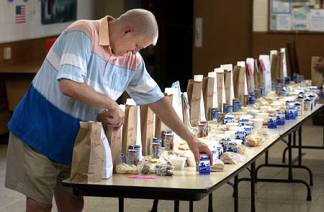|
|
Valuable Senior Volunteers Getting Older, More Scarce
By Steve Levin, Pittsburgh Post-Gazette
July 6, 2004

Photo: By Darrell Sapp
Ed Moore has been a volunteer with the Brighton Heights Meals on Wheels program for 2 1/2 years.
Three times a week -- sometimes as many as five -- Moore, 67, makes the short drive from his house in nearby Ross to the Brighton Heights Lutheran Church to pick up and deliver about 20 meals.
Each volunteer day requires about two hours of Moore's time. "I never thought I'd enjoy that much, but I do," he said.
Volunteers like Moore are hard to find. For the third year in a row, the percentage of "older adults," those 65 and older, who did volunteer work was second-lowest among all age groups, according to the U.S. Department of Labor.
Because older adults who do volunteer devote more hours to it than people in every other age group, the dearth of older volunteers is magnified.
Meals on Wheels is one of the hardest-hit programs, because it needs volunteer drivers and kitchen workers during traditional work hours -- the morning and early afternoon -- when mostly older retirees tend to be available.
Nationally, more than 4,000 Meals on Wheels programs deliver about 3 million meals daily. That includes nearly 300 programs in Pennsylvania, 50 in the Pittsburgh area.
The bulk of recipients are 85 and older, the country's fastest-growing age group. They are more likely to be home-bound, have chronic conditions and need medical and social services.
Unfortunately, in many Meals on Wheels programs, that has come to describe the volunteers, too.
"The older ones are falling apart," said Vera Ryan, coordinator of South Hills Meals on Wheels. "They have disabilities, they're unable to walk. They just can't do it anymore. The drivers and deliverers are what we're so short on. It's getting really bad."
While the national office has no data on whether its number of older volunteers is declining, Peggy
Ingraham, Meals on Wheels' director of policy and legislation, said "without a doubt, it is the case."
"Our time has been spent on expanding our finances vs. getting more volunteers and recruitment and retention," she said. "We sort of forgot that our volunteer pool was going to be aging, too."
The Labor Department numbers between September 2002 and September 2003 showed that 63.8 million people did some volunteer work during that time. Those 65-and-over had a volunteer rate of less than 24 percent, slightly better than the early-20s group rate of about 20 percent. The group most likely to volunteer was the 35-to-44 age group, at about 35 percent.
Tess Scannell is director of Senior Corps, a national network of programs like RSVP (Retired and Senior Volunteer Program), involving more than half a million Americans ages 55 and older. She called the rapidly shrinking World War II generation the "old model of retirement."
They have "a sense of duty," she said, not just to their peers but to the country's welfare, and they're willing to commit themselves for an extended period of time. Yet, as they age, they're often isolated. Chances are they've lost a spouse. The women rarely worked outside the home and have a smaller network of friends. Their children live elsewhere.
"It's hard to go out and convince people who have already isolated themselves to come out and get engaged," Scannell said. But if that can be accomplished, volunteering often becomes an important social component of their lives.
Volunteering is being connected to the community, she said, typically in one-on-one situations like mentoring in schools or the Meals on Wheels program.
That type of contact is what drew Moore, a retired U.S. Postal Service employee.
"They have good days and bad days," he said of his clients. "Some of them like to talk. One lady held me up for 20 minutes. She thinks I'm a godsend."
All Moore did was help get her to the hospital after finding her unconscious. In other instances, he's cleared sidewalks of ice or reported medical problems.
That's why Meals on Wheels likes older adult volunteers when it can get them.
"The older people will take the time and they're very concerned about the health and welfare of the clients," said Fraida
Estrin, coordinator of Mollie's Meals in Squirrel Hill, which delivers as many as 100 kosher meals a day.
"They take it very seriously. They see it as something that keeps them going. They have more time and they know who they're dealing with. The younger [volunteers] are more in a hurry."
Contrasting with Scannell's "old model" of volunteering are baby boomers. Studies have shown that boomers -- some call them "younger seniors" -- are less interested in repetitive volunteer work like Meals on Wheels. Still working, possibly in a second career, their free time is divided among lengthy vacations, raising children or relocating. Research shows they want to have an impact and move on.
The question pondered by volunteer organizations is just what kind of opportunities will interest the more than 75 million baby boomers, the first of whom turn 60 in 2006.
They are interested in "episodic volunteer opportunities," said Pennsylvania Secretary of Aging Nora Eisenhower, "something that's a purposeful relationship. We need to be in place ... anticipating in a positive way and in a welcoming way saying, 'We have something that will be of interest to you.' "
In the meantime, Meals on Wheels site managers like Fred Mundy will continue trying to recruit more volunteers for the Brighton Heights program. This week, he will not only coordinate deliveries but also serve as substitute cook. He'll probably end up delivering meals, too.
"We've tried recruiting in church bulletins," said Mundy, 57. "We even thought about trying something on a cable channel. Nothing's worked. If they could just give one day out of the week where I could have a driver and a runner, it'd be great."
|
|



